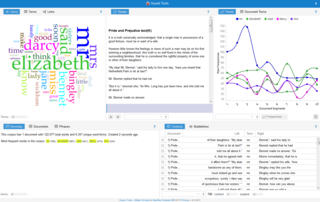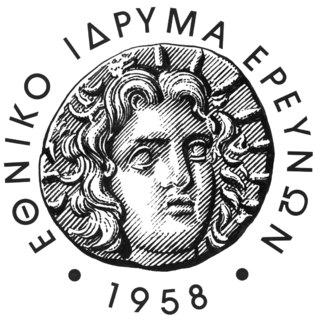The Perseus Digital Library, formerly known as the Perseus Project, is a free-access digital library founded by Gregory Crane in 1987 and hosted by the Department of Classical Studies of Tufts University. One of the pioneers of digital libraries, its self-proclaimed mission is to make the full record of humanity available to everyone. While originally focused on the ancient Greco-Roman world, it has since diversified and offers materials in Arabic, Germanic, English Renaissance literature, 19th century American documents and Italian poetry in Latin, and has sprouted several child projects and international cooperation. The current version, Perseus 4.0, is also known as the Perseus Hopper, and is mirrored by the University of Chicago.
The Graduate School and University Center of the City University of New York is a public research institution and postgraduate university in New York City. Serving as the principal doctorate-granting institution of the City University of New York (CUNY) system, The CUNY Graduate Center is classified among "R1: Doctoral Universities – Very High Research Activity". The school is located at the B. Altman and Company Building at 365 Fifth Avenue in Midtown Manhattan. The CUNY Graduate Center offers 31 doctoral programs, 14 master's programs, and 30 research centers and institutes. It employs a core faculty of approximately 140, who are supplemented by 1,800 faculty members from CUNY's eleven senior colleges and New York City's cultural and scientific institutions. As of June 2024, the Graduate Center enrolls 3,228 students, of which 2,621 or 81% are doctoral students.

The Berkman Klein Center for Internet & Society is a research center at Harvard University that focuses on the study of cyberspace. Founded at Harvard Law School, the center traditionally focused on internet-related legal issues. On May 15, 2008, the center was elevated to an interfaculty initiative of Harvard University as a whole. It is named after the Berkman family. On July 5, 2016, the center added "Klein" to its name following a gift of $15 million from Michael R. Klein.

The Center for Hellenic Studies (CHS) is a research institute for classics located in Washington, D.C. at 3100 Whitehaven Street NW. It is affiliated with Harvard University.

Digital humanities (DH) is an area of scholarly activity at the intersection of computing or digital technologies and the disciplines of the humanities. It includes the systematic use of digital resources in the humanities, as well as the analysis of their application. DH can be defined as new ways of doing scholarship that involve collaborative, transdisciplinary, and computationally engaged research, teaching, and publishing. It brings digital tools and methods to the study of the humanities with the recognition that the printed word is no longer the main medium for knowledge production and distribution.
The California Digital Library (CDL) was founded by the University of California in 1997. Under the leadership of then UC President Richard C. Atkinson, the CDL's original mission was to forge a better system for scholarly information management and improved support for teaching and research. In collaboration with the ten University of California Libraries and other partners, CDL assembled one of the world's largest digital research libraries. CDL facilitates the licensing of online materials and develops shared services used throughout the UC system. Building on the foundations of the Melvyl Catalog, CDL has developed one of the largest online library catalogs in the country and works in partnership with the UC campuses to bring the treasures of California's libraries, museums, and cultural heritage organizations to the world. CDL continues to explore how services such as digital curation, scholarly publishing, archiving and preservation support research throughout the information lifecycle.

Archnet is a collaborative digital humanities project focused on Islamic architecture and the built environment of Muslim societies. Conceptualized in 1998 and originally developed at the MIT School of Architecture and Planning in co-operation with the Aga Khan Trust for Culture. It has been maintained by the Aga Khan Documentation Center at MIT and the Aga Khan Trust for Culture since 2011.

An academic library is a library that is attached to a higher education institution and serves two complementary purposes: to support the curriculum and the research of the university faculty and students. It is unknown how many academic libraries there are worldwide. An academic and research portal maintained by UNESCO links to 3,785 libraries. According to the National Center for Education Statistics, there are an estimated 3,700 academic libraries in the United States. In the past, the material for class readings, intended to supplement lectures as prescribed by the instructor, has been called reserves. Previously before the electronic appliances became available, the reserves were supplied as actual books or as photocopies of appropriate journal articles. Modern academic libraries generally also provide access to electronic resources.

The University of the Peloponnese is a Greek tertiary educational institution, composed of campuses in Tripoli, Corinth, Kalamata, Nafplio, Sparta, and Patras with more than 25,000 students in 9 schools across the campuses, with the former being in turn composed of 22 departments.
The Franklin Humanities Institute (FHI) is an interdisciplinary humanities center at Duke University dedicated to supporting humanities, arts, and social science research and teaching. Named after the prominent African American historian and civil rights activist John Hope Franklin, who retired from Duke in 1985 as the James B. Duke professor of history, the institute has also made a commitment to promote scholarship that enhances social equity, especially through research on race and ethnicity.

The Information Society Project (ISP) at Yale Law School is an intellectual center studying the implications of the Internet and new information technologies for law and society. The ISP was founded in 1997 by Jack Balkin, Knight Professor of Constitutional Law and the First Amendment at Yale Law School. Jack Balkin is the director of the ISP.

The Mohammed Bin Rashid School of Government, is a research and teaching institution located in Dubai, United Arab Emirates. Original founded in 2005 as the Dubai School of Government, public policy in the Arab world is the focus of the institute. Sheikh Mohammed bin Rashid Al Maktoum, Vice President and Prime Minister of the United Arab Emirates, and Ruler of Dubai, is responsible for the academy's creation. Yassar Jarrar was the founding executive.
Hellenic studies is an interdisciplinary scholarly field that focuses on the language, literature, history and politics of post-classical Greece. In university, a wide range of courses expose students to viewpoints that help them understand the historical and political experiences of Byzantine, Ottoman and modern Greece; the ways in which Greece has borne its several pasts and translated them into the modern era; and the era's distinguished literary and artistic traditions.
The Center for Homeland Defense and Security at the Naval Postgraduate School (NPS) in Monterey, California is a school focusing on homeland security education.
The University of CEMA is a private university in Buenos Aires, Argentina. It was founded by Carlos Rodríguez, along with Roque Fernández and Pedro Pou, as the Center for Macro-economic Studies of Argentina (CEMA) University Institute in 1995, a pioneer in higher education programs in the areas of economics, politics, management, and finance in Argentina.
The Southeast Asia Program (SEAP) was founded in 1950 to promote the acquisition and dissemination of knowledge about countries, cultures and languages of the region. It is an interdisciplinary program of Cornell University that focuses on the development of graduate training and research opportunities on the languages and cultures of Brunei, Burma, Cambodia, Indonesia, Laos, Malaysia, the Philippines, Singapore, Thailand, and Vietnam. Cornell University is known for being the "Mecca of Southeast Asian studies."

The National Hellenic Research Foundation is a non-profit, private-law legal entity established in 1958 with the aim of conducting interdisciplinary research in the fields of science and the humanities. It is supervised by the General Secretariat for Research and Technology (GSRT) of the Ministry of Development and Investment (Greece).
Ann Bergren was Professor of Greek literature, Literary Theory, and Contemporary Architecture at University of California, Los Angeles. She is known for her scholarship on Ancient Greek language, gender, and contemporary architecture.
Casey Dué Hackney, sometimes cited or referred to as Casey Dué, is a professor of classical studies at the University of Houston, and the Executive Editor for the Center for Hellenic Studies. Her research interests centre around Homeric poetry, Greek tragedy and Greek oral traditions.








